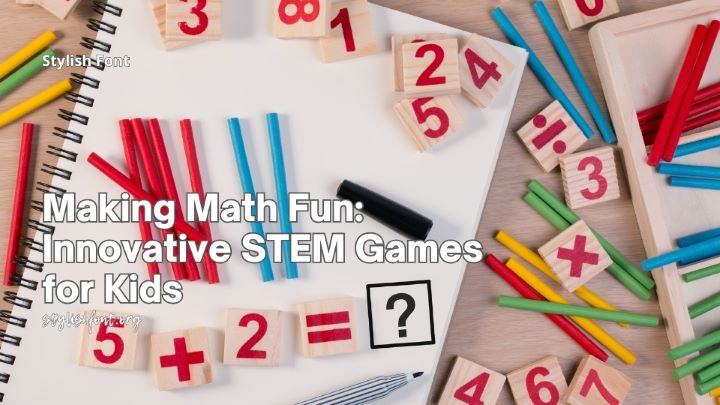Innovative STEM games transform math into an enjoyable experience for kids, blending learning with play. These games use engaging formats to teach mathematical concepts, fostering problem-solving skills and critical thinking. By integrating technology and hands-on activities, children develop a positive attitude toward math, enhancing their academic performance and interest in STEM fields.
The Importance of STEM Education
STEM education—science, technology, engineering, and mathematics—is crucial for developing children’s critical thinking, problem-solving skills, and creativity. By integrating these various subjects and encouraging hands-on learning, STEM education enables children to understand how different fields are interconnected and relevant to real-world scenarios. For instance, understanding mathematical principles enhances their grasp of scientific concepts, while engineering teaches them the practical application of both.
According to Edutopia, integrating STEM with the arts (STEAM) can further enhance these benefits by fostering creativity and making education a holistic experience. This integration encourages students to think outside the box, combining technical skills with artistic creativity to innovate and solve problems. Such a comprehensive approach to learning prepares children for the complex world, where multidisciplinary knowledge is critical to success.
Like many available math board games, math-related games make learning engaging and enjoyable. These games help children grasp complex concepts through play, promoting active learning, often resulting in better information retention than traditional methods. Games offer an interactive way to practice mathematical skills, making abstract concepts more tangible and less intimidating.
Benefits of Math-Related Games
Math-related games offer numerous benefits for child development. One of the primary advantages is the enhancement of critical thinking skills. Children engaging in these games must make decisions, solve problems, and think strategically. This kind of cognitive exercise is vital for overall intellectual growth. These games provide scenarios where children learn to analyze situations, predict outcomes, and devise strategies.
Additionally, math games help to reduce math anxiety. Many children experience anxiety when faced with math problems, which can hinder their performance. These games foster a good learning atmosphere where kids are more willing to take chances and make mistakes because they make math issues seem entertaining and exciting. This boosts their self-esteem and encourages a development mindset, the conviction that skills can be acquired with commitment and effort.
Types of STEM Games
Board Games
Board games are fantastic tools for reinforcing basic math skills and strategic thinking. Players can improve their mathematics and logical reasoning skills by managing resources and making deliberate decisions in games like Settlers of Catan and Monopoly. These games often involve complex rules and strategies that require careful thought and planning, making them excellent for developing critical thinking skills in a fun and engaging manner.
Digital Games
In the digital age, video games focusing on STEM can be incredibly effective. These games are often interactive and adaptive, providing a personalized learning experience. Apps and online platforms offer endless possibilities for engaging children in math and science activities that suit their paces and levels. Digital games that provide instant feedback can aid children in learning from their errors and developing a more profound comprehension of many disciplines.
Hands-On Activities
Kits and building sets like LEGO and robotics kits encourage experimentation and problem-solving. These hands-on activities allow children to apply mathematical concepts in tangible ways, deepening their understanding and making learning more meaningful. Children understand how mathematical and scientific ideas are directly applied when they build models or solve mechanical puzzles, which helps to make these ideas more approachable and relatable.
How to Incorporate STEM Games into Learning
Incorporating STEM games into everyday learning can be straightforward. Parents and educators can dedicate a specific time each day to these games, integrate them into lesson plans, or even use them as a reward for completing other schoolwork. For instance, setting aside a “game hour” after homework can motivate children to finish their tasks more efficiently. Making STEM games a routine part of the educational process makes children more likely to engage with and enjoy learning these subjects.
Furthermore, STEM games can be used to supplement traditional teaching methods. For example, if a child is learning about fractions in school, a game that involves fraction-related puzzles can reinforce this knowledge through practical application. This integrated approach helps to solidify the child’s understanding and makes learning more dynamic and enjoyable.
Parents’ and Teachers’ Roles in STEM Education
Parents’ and educators’ involvement is essential in encouraging a child’s interest in STEM. Encouraging play with educational games and setting positive examples can help children see the fun and excitement in learning math and science. Parents and teachers should also provide support and resources, such as access to STEM-related toys and activities, to nurture a child’s curiosity and enthusiasm.
For example, parents can set up a favorable learning atmosphere at home, and teachers can supplement traditional teaching techniques with STEM activities in the curriculum. Giving kids the chance to investigate and try out STEM ideas both at home and at school guarantees a well-rounded education that encourages a passion for learning that lasts a lifetime.
Real-World Examples of Successful STEM Games
Numerous examples of STEM games making a significant impact exist. For instance, games like “Robot Turtles” and “Code Master” teach coding basics to young children in a fun and engaging way. These games introduce coding concepts and promote problem-solving and logical thinking. They simplify complex ideas into digestible chunks so kids may learn coding principles without feeling overwhelmed.
Other examples include math-centric board games like “Prime Climb” and “Mathematical Genius,” which challenge children to use arithmetic creatively and strategically. These games make mathematical concepts accessible and enjoyable, demonstrating the potential of gamified learning to make complex subjects engaging for children. By turning learning into a game, these tools remove the fear and anxiety often associated with math and science, fostering a positive attitude toward these subjects.
Research and Data on the Effectiveness of STEM Games
Studies have shown that STEM games can improve academic performance and build essential skills. According to Scientific American, students engaged in STEM activities perform better on standardized tests and are more interested in related careers. These games enhance understanding of mathematical concepts and promote critical thinking, collaboration, and creativity.
Moreover, research indicates that children involved in STEM learning are more likely to pursue higher education and careers in these fields. Early STEM education can help kids acquire the knowledge and self-assurance necessary to thrive in a quickly changing technological environment. The impact of these educational tools is profound, shaping tomorrow’s future leaders and innovators.
Conclusion
Integrating STEM games into children’s learning routines can significantly impact their education and future success. These educational games foster critical thinking and enjoyment, vital in the modern world. As parents and educators, embracing these tools and fostering a love for learning through play is crucial. By doing so, we can prepare our children for a future where STEM skills are increasingly valuable, ensuring they have the knowledge and confidence to tackle the challenges of tomorrow.





